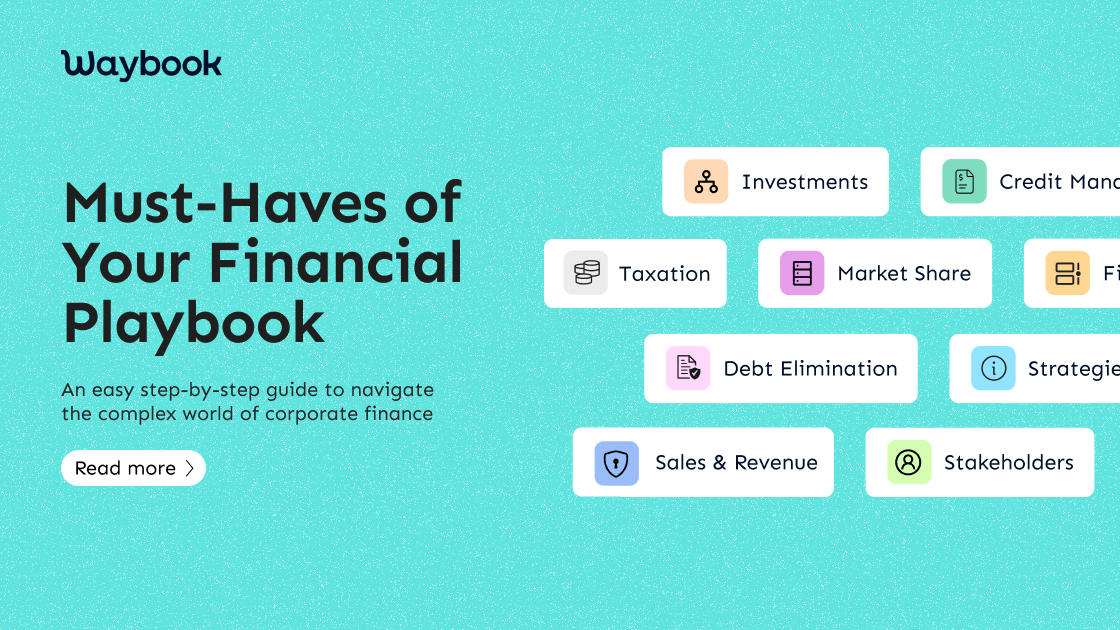It can seem daunting when attempting to develop a structured financial playbook for your business, especially if you've never done it before. An optimal financial plan can evaluate your assets, savings, and debts and establish goals to propel you forward.
Entrepreneurs working to keep their small businesses going through and beyond these challenging times have access to plenty of sources of information and strategies. Here in this article, we have sorted out the ins and outs of how to create a financial playbook for SMEs that can help them achieve their financial goals.
This topic will cover;
- What is a Financial Playbook?
- Why is the Financial Playbook important for SMEs?
- How to Create a Financial Playbook for SMEs?
- Define Goals for the Financial Playbook
- When will the Playbook Trigger?
- Identify Key Stakeholders
- List Procedures for Taxation
- Build Future Financial Plan
- Set KPIs to Determine the Success of the Playbook
- Conclusion
Let’s discuss them one by one;
What is a Financial Playbook?
Your financial playbook for SMEs is an easy-to-read guide to navigating the complex world of corporate finance. This book looks at all aspects of corporate finance, including investing, debt elimination, credit management, money-saving tips, future planning, and teaching your employees about useful revenue capitalization techniques.
Before we write anything about the financial playbook, make sure to avoid these seven mistakes to achieve success.

Why is the Financial Playbook important for SMEs?
The importance of financial management cannot be overstated in a corporation.
Let's say you own an advertising agency and landed a big client. Initially, you'd party. Then you’d go to finance and tell them proudly about the deal you just cracked. Suddenly, your finance manager starts rambling about the potential threat the deal could pose to your company's financial stability.
You would take on some major debt along with some significant interest rates. It will take a long time to implement the project, so money won't come anytime soon to cover the expenses. Therefore, your happy deal is not financially lucrative.
Having a financial playbook that states all of the business decisions and their financial feasibility can help the upper management to understand this aspect of the business.
Here are a few benefits attributed to having a financial playbook for SMEs
- Understand your business's financial processes and identify the ones that are optimal for them
- Make the right choice when choosing accountants
- Learn how to maximize tax efficiencies and little-known tax tips
- As a financial bible, it serves as a reference guide for your business
- Analyze automation versus outsourcing decisions
Elizabeth Wasserman— the editor of the Inc. technology segment— writes, “the financial section of a business strategy is an essential component of the plan, as you’ll need it if you’ve any hope of winning over investors or getting a loan from a bank. Even if you’re not looking at financing, you should craft a financial forecast to simply be successful in steering your company’s business.”

How to Create a Financial Playbook for SMEs?
Having learned about the concept of a financial playbook and why it is important for your business operations. Let's put one together.
Assume you're a startup with all the funds available at the beginning. However, eventually, the funds will run out as you consume resources to build your company. A company's reputation can be adversely affected if you rely on funding for an extended period of time.
Financial playbooks for SMEs come into play here. The playbook will include all the steps to increase future growth and identify the financial feasibility of each action.
Let’s create a scenario in which you are a SaaS business owner. As a SaaS company, a major part of your business will go to hiring tech talent and product promotion. Here are a few steps you have to take.
Define Goals for the Financial Playbook
Defining goals and developing an overarching strategy is essential before you do anything else. KPIs must be applied to every aspect of corporate financial management and account handling.
You will need to create a complete service blueprint of your financial situation and map out the strategies to improve it. And you will need to define your target operating model around the strategies and blueprint.
- Define what you have to build on in your strategies.
- What would be the pace of your growth?
- Are there any specific margins you are aiming to hit?
- What would be your break-even burn rate?
- To achieve our long-term goals, what major investments are needed?
- What level of aggressiveness will we use to gain market share?
When will the Playbook Trigger?
For action that affects the financial liquidity of your company, you have to consider a strategy. You can add all the potential situations, whether for initial hiring or some potential investment, and have to craft a definitive financial plan to bring the most capital out of it.
For instance, your company intends to hire a new employee to launch a marketing campaign. Before hiring, your playbook should tell the finance department who will be responsible for releasing and managing the funds.
What will the estimated ROI that campaign generate? Will it be enough to cover the initial cost of the project? How much can this investment aid us in the long run?
Identify Key Stakeholders
Identify and list all the key stakeholders in your financial playbook. First, you have to determine the stakeholders who are directly responsible for the organization's financial operations. Whether internal stakeholders, investors, or government departments can be part of the decision-making process, It varies depending on your organizational needs and project requirements.
Continuing with the previous example, during the onboarding process, if the campaign needs more funds, which particular person or stakeholder will deal with it? All the procedures will be added to your playbook.
List Procedures for Taxation
Actions taken to collect taxes in accordance with the law are considered tax procedures. The stakeholder of your organization should be aware of both internal and external audit procedures.
In order to ensure that your company looks good on paper, they must take the necessary actions, such as maintaining tax reports, investment papers, and revenue reports. By having a financial playbook at hand, they can find out what needs to be done and how to do it instead of facing ambiguities.
Build Future Financial Plan
Your financial plan should not only cover the current business financial needs and requirements, but it should also have a roadmap of how they can lead to capitalization and more revenue.
Set KPIs to Determine the Success of the Playbook
For your financial playbook to be successful, you must set KPIs. From your company's total revenue generation to your financial equilibrium, you can have a smooth internal and external audit process with set KPIs.

Conclusion
The financial playbook plays an important role in the health of your company's finances. With Waybook's customized financial playbook for SMEs, you can stay on top of your financial goals. The easy-to-use interface allows you to customize the overall playbook.
Furthermore, all training materials and third-party apps can be easily incorporated into the system, so there is no need to worry about ambiguities. All stakeholders can easily access the playbook at any time.
Want to get more insights on the future of Scaling & Systematizing your business? Check out our related resources:
- How to Create an ABM Playbook for SMEs
- How to Build a Custom Sales Playbook | Best Practices & Templates
- Must-Have Playbooks for Business Scaling | Business Playbooks








